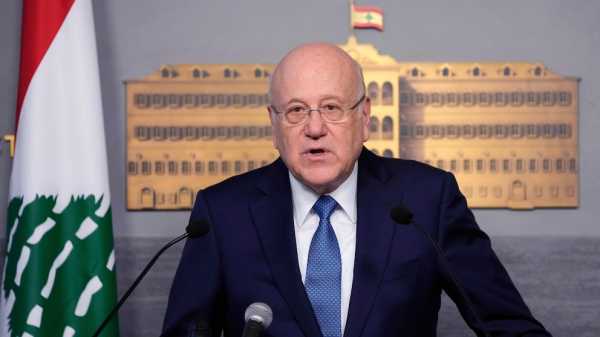
BEIRUT — Over a thousand Syrian refugees each week fleeing to Lebanon from their country’s worsening economic and financial conditions “could create harsh imbalances” in the small Mediterranean nation, caretaker Prime Minister Najib Mikati warned Thursday.
Over the past months, thousands of Syrian citizens made it to Lebanon through illegal crossing points seeking a better life. But Lebanon is going through its own four-year meltdown, with a drowning economy pinning its hopes on tourism and crumbling infrastructure where electricity and water cuts are widespread.
In the early years after conflict broke out in Syria in March 2011, Lebanon received hundreds of thousands of refugees. That changed in later years, especially after Lebanon’s economic crisis broke out in October 2019.
The Syrian conflict has killed half a million people and displaced half the country's pre-war population of 23 million, including more than 5 million Syrians who fled the country, mostly to neighboring countries. Refugees usually pay smugglers to bring them to Lebanon through the long, shared border.
The Lebanese army said in a statement Thursday that it prevented 1,200 Syrians from crossing into Lebanon this week alone. It said another 1,100 Syrians were prevented from reaching Lebanon the previous week.
Speaking at the start of a Cabinet meeting Thursday in Beirut, Mikati said what is worrying about the influx in refugees is that most of them are young men and women.
“That threatens our entity’s independence and could create harsh imbalances that could affect Lebanon’s demographic balance,” Mikati said.
The demographic in question may be religious affiliation, as the vast majority of Syrians are Sunni Muslims. Lebanon, known for its religious diversity in the region, has struggled to keep peace between its 18 religious sects. Today, Christians make up nearly a third of the population, while the other two-thirds are almost equally split between Shiites and Sunnis.
Mikati said another Cabinet session will be held next week with the commander of the army and heads of security agencies to discuss refugees.
Lebanon hosts some 805,000 United Nations-registered Syrian refugees, but officials estimate the actual number is far higher: between 1.5 million and 2 million.
Issam Charafeddine, Lebanon’s caretaker minister of the displaced, told a local radio station that 8,000 Syrian refugees entered Lebanon through illegal crossing points since the beginning of August. He said 20,000 refugees have crossed since the beginning of the year.
Living conditions are worsening in Syria, where inflation surged after President Bashar Assad’s decision in August to double public sector wages and pensions. The crisis led to protests mostly in Sweida, the southern province that borders Jordan.
Syria’s economy has been struggling after years of conflict, corruption and mismanagement, and Western-led sanctions over accusations of government involvement in war crimes and the illicit narcotics trade. The U.N. estimates that about 90% of the population lives in poverty. The Syrian pound’s value against the U.S. dollar declined to an all-time low of 15,000 pounds to the dollar in August. At the start of the conflict in 2011, the dollar was trading at 47 pounds.
___
Follow AP’s coverage of global migration: https://apnews.com/hub/migration
Sourse: abcnews.go.com






